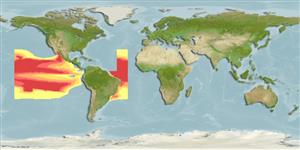分類 / Names
共通名の | 類義語 | Catalog of Fishes(部類, 種) | ITIS | CoL | WoRMS | Cloffa
板鰓亜鋼(サメとエイ類) (sharks and rays) >
Lamniformes (Mackerel sharks) >
Odontaspididae (Sand tiger sharks)
Etymology: Odontaspis: Etymology not explained, presumably odontos (Gr.), tooth, and aspis (Gr.), shield, perhaps referring to how teeth comprise a prominent narrow cusp provided with two or more small “side teeth” (translation), i.e., cusplets, which, with some imagination, could be said to “shield” the main cusp; another explanation: aspis (L.), viper, perhaps referring to outwardly pointing teeth of O. ferox, like that of a viper (See ETYFish); noronhai: In honor of Adolfo César de Noronha (1873-1963), late director of the Funchal Museum (Madeira), where holotype is housed (See ETYFish).
Eponymy: Adolfo César de Noronha (1873–1963) was a naturalist and librarian who was Director of the Funchal Museum in Madeira (where the type specimen of the shark is housed). [...] (Ref. 128868), visit book page.
Environment: milieu / climate zone / depth range / distribution range
生態学
海; 深さの範囲 60 - 1000 m (Ref. 10722). Deep-water; 31°N - 34°S, 163°W - 27°W (Ref. 54682)
Eastern Atlantic: Madeira and southern Brazil. Eastern Central Pacific: off Hawaii. May eventually be recorded from the Western Central Pacific (Ref. 13568). Questionably occurring in Seychelles.
Length at first maturity / サイズ / 重さ / 年齢
Maturity: Lm 325.0 range ? - ? cm
Max length : 367 cm TL オス/雌雄の選別がない; (Ref. 247); 326.0 cm TL (female)
Snout conical and bulbous, tip rounded. Eyes large and ovoid, nictitating membrane absent. Body color uniform chocolate brown, all fins except pectorals with thin dark edging along posterior margin.
A deepwater shark inhabiting the continental and insular slopes (Ref. 50449, 58302). Pelagic (Ref. 58302). Ovoviviparous, embryos feeding on yolk sac and other ova produced by the mother (Ref. 50449). Feeding habits unknown.
Life cycle and mating behavior
成熟 | 繁殖 | 放精 | 卵 | 生産力 | 幼生
Exhibit ovoviparity (aplacental viviparity), with embryos feeding on other ova produced by the mother (oophagy) after the yolk sac is absorbed (Ref. 50449). Distinct pairing with embrace (Ref. 205).
Compagno, L.J.V., 1984. FAO Species Catalogue. Vol. 4. Sharks of the world. An annotated and illustrated catalogue of shark species known to date. Part 1 - Hexanchiformes to Lamniformes. FAO Fish. Synop. 125(4/1):1-249. Rome, FAO. (Ref. 247)
IUCNのレッドリストの状況は (Ref. 130435: Version 2024-1)
Human uses
水産業: 潜在的興味の
用具
特記事項
XMLをダウンロードして下さい
インターネットの情報源
Estimates based on models
Preferred temperature (Ref.
123201): 8.6 - 15.2, mean 12 °C (based on 13 cells).
Phylogenetic diversity index (Ref.
82804): PD
50 = 0.8125 [Uniqueness, from 0.5 = low to 2.0 = high].
Bayesian length-weight: a=0.01122 (0.00514 - 0.02450), b=3.04 (2.87 - 3.21), in cm total length, based on all LWR estimates for this body shape (Ref.
93245).
栄養段階 (Ref.
69278): 4.4 ±0.4 se; based on size and trophs of closest relatives
回復力 (Ref.
120179): 非常に低い, 14年以上の倍増期間の最小個体群 (Fec assumed to be <10).
Fishing Vulnerability (Ref.
59153): Very high vulnerability (90 of 100).
